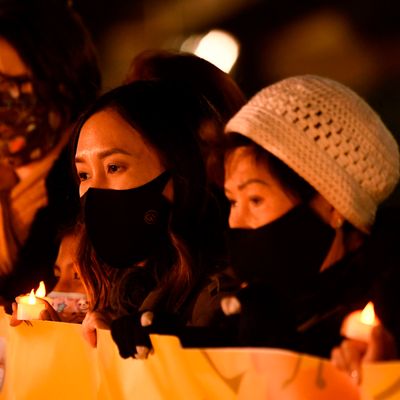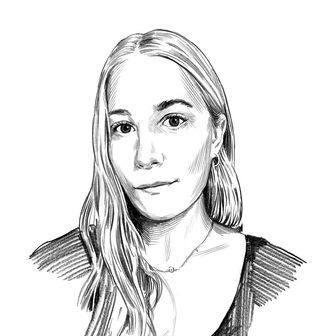
The disturbing rise in anti-Asian racist incidents across the United States in the past year has particularly impacted Asian and Asian American women, according to new data from reporting forum Stop AAPI Hate. Researchers collected reports of 3,800 incidents between March 2020 and February 2021, including verbal attacks, vandalism, and physical assaults. Of the people who sent their experiences to the forum, nearly 70 percent were women; women reported hate incidents 2.3 times more than men.
The data was released yesterday, in the hours before a white gunman entered three massage parlors in the Atlanta area and murdered eight people, six of whom were Asian women. Though police have yet to explicitly name a motive, the horrifying violence occurred against a backdrop of a recent wave of racist, xenophobic targeted acts against Asians. Multiple video recordings of Asian elders being physically assaulted went viral in the first months of 2021, and NYPD data has shown a staggering 1,900 percent increase in anti-Asian hate crimes in New York City in the past year.
Much of the analysis of the spike in anti-Asian hate has focused on the racism whipped up by Donald Trump and other right-wing politicians in describing the COVID-19 pandemic as “the China virus” and using other racist language on their hugely influential platforms. But the murders in Atlanta have ignited a discussion about the intersections of racism, xenophobia, misogyny, and poverty that leave Asian women especially vulnerable to violence — not just during the coronavirus pandemic but as a result of centuries’ worth of discrimination and oppression. “There is an intersectional dynamic going on that others may perceive both Asians and women and Asian women as easier targets,” Russell Jeung, professor of Asian American studies at San Francisco State University and the forum’s founder, told NBC.
The Asian women who were killed in Atlanta were working in massage parlors. Not only are these workers, for very little pay with little protection, often subject to violence in their businesses, but they are also heavily surveilled and policed by law enforcement. A 38-year-old massage-parlor worker named Yang Song in Queens fell to her death in 2017 during an NYPD Vice sting in which officers were trying to arrest her; a report that year from the Urban Institute and the Legal Aid Society said arrests of Asian-identified people in New York City, charged with both unlicensed massage and prostitution, increased by 2,700 percent between 2012 and 2016.
Red Canary Song, a grassroots collective of Asian sex workers fighting for decriminalization, wrote on Twitter, “Eight workers in massage parlors have been killed in Atlanta. This is horrific, and is indicative of the violence that massage workers face daily. We are saddened and angered to learn of this, and we are sending our love to the workers in Atlanta.” Hyejin Shim, a founder of Survived and Punished, another grassroots organization, wrote, “Solidarity with Asian women working in the sex trades, with Asian women unprotected from violence & exploitation in their workplaces, with Asian women targeted by gendered racial violence & racialized sexual violence every day.”
The researchers at Stop AAPI Hate say that the amount of incidents in their data is likely only a fraction of those that have actually occurred, since they were self-reported. According to the Pew Research Center survey, they write, “three in 10 Asian Americans (31%) report having experienced racial slurs or racist jokes since the beginning of the pandemic.”


